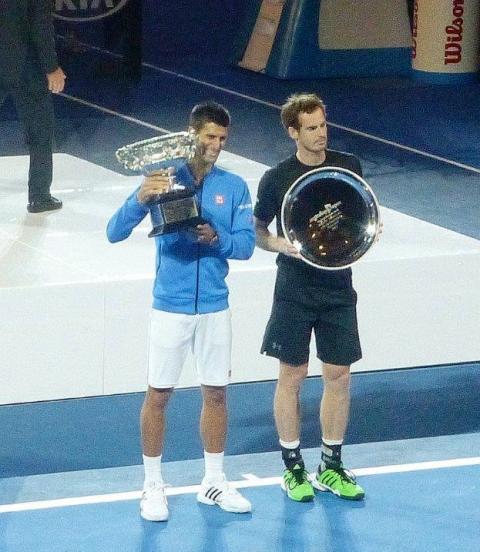
For British tennis fans, Andy Murray represents something of an unnerving enigma. Is he the world-class player that the media has built up, whose incredible returns, stamina and shot-making we occasionally see on our screens? Or is he another journeyman in the Tim Henman mold, whose only constant characteristic is to fail on the big stage?
It has all been brought to the fore by Murray’s latest defeat—to Novak Djokovic in the recent Australian Open final. Having matched Djokovic shot for shot in a grueling first two sets, Murray found the score at one set apiece with him 2-0 up in the third. But he eventually lost 12 of the subsequent 13 games in what pundit Pat Cash described as a “meltdown.” This appeared to follow in the vein of Grand Slam final defeats in Flushing Meadows in 2008 and at earlier Australian Opens in 2010, 2011, and 2013.
The truth, of course, is, more nuanced. Since breaking into the top 4 of the ATP World Tour rankings in 2008, Murray has spent 174 weeks in fourth, 69 in third, and 21 in second, but he has never claimed the No. 1 spot. The truth is that in an individualist, winner-take-all game like tennis, Murray is competing with the likes of Djokovic, Rafael Nadal, and Roger Federer—some of the greatest players to ever lift a racquet.
But now we reach the most idiosyncratic element of Murray’s game: his tendency towards self-doubt, undirected displays of temper, and general difficulty in keeping his game together in the biggest encounters. A study in the Journal of Sport Science found that Grand Slam winners exhibited “mental toughness”, the ability to turn a negative event (like losing a crucial point) into a positive response. They also found that first serves and second-serve returns—both strong areas of Murray’s game—are strong predictors of overall success.
However, Murray does not appear to be able to maintain his impressive statistics through the duration of a big match against top players. As things started to slip away against Djokovic, Murray could be seen shouting “how many times,” smashing a racquet, and otherwise admonishing himself.
At least Murray still retains widespread support from the majority of the British. Days after losing to Djokovic, Murray’s wedding announcement brought a flood of goodwill and bookmakers Coral are even offering enhanced odds on horses with tennis-related names at the Grand National (the wedding day).
But imposing the label of “choker” on Murray is both unfair and unwarranted. Bear in mind that through much of his career, he has suffered debilitating back problems that have put him out of action for long periods. Although the “talented player, no resolve” narrative appears to fit well, we might consider that there are several complementary factors at play. Although Murray has lost six of eight Grand Slam finals, he has almost always begun strongly. It is simply possible that part of his apparent “collapse” is stronger opponents with more stamina taking advantage of his fatigue.
Discussing the failures in Murray’s “big match” play has become a national pastime; which we can expect to revisit in every subsequent final Murray might reach. However, we should remember that Murray’s primary opponent is standing across the court from him, not demons in his own head. Win or lose, Murray is a national sporting treasure who should be allowed to play the big matches without his nation trying to diagnose his condition in the meantime.
[polldaddy poll=8647045]
[polldaddy poll=8647050]




“Or is he another journeyman in the Tim Henman mold, whose only constant characteristic is to fail on the big stage?”
Two slams to his name, a Gold Medal and losing to the likes of Federer and Djokovic in five other slam finals can in no possible way define a journeyman. To even suggest such an argument could be made is rickyculous.
On the contrary, in any other era, Muzza would have 5+ slams easy. He is in the Top 20 players to have ever played the game IMO. At 11-12, he has the second best h2h record vs Fed with more than five matches played.
Journeyman? Interesting article overall Ricky and of course your conclusion is obvious but I easily dismissed that “debate” in a few short sentences. There is nothing to debate.
Journeyman? Are we talking’ ’bout a journeyman? Journeyman? Gilles Simon yes. Steve Perry definitely.
But to possibly suggest Murray as a possiblility?
#YouSerious?
I didnt write this, obviously
Ummm. What? Isn’t that your name on the byline above?
Will the Real Slim Ricky please stand up? Please stand up. Please stand up.
we went over this about 2 weeks ago. Guess the discussion on that thread went over your head!
#whoosh
Oh you mean the part about calling him a journeyman? Who said so then?
No
We talked about Muzza as a journeyman?
Journeyman. We talkin’ bout journeyman. Journeyman.
C’mon man!
we did not. And will not.
and agreed. Journeyman is preposterous.
Also a journeyman would not be “in the Tim Henman mold.”
#FYI
It’s not too late. Just change “journeyman” to “underachiever” but even that would be a far stretch for anyone to make. Still, it would make the argument a bit more debatable.
#HereToHelp
That would help, but wouldnt fix it.
“Or is he another journeyman in the Tim Henman mold, whose only constant characteristic is to fail on the big stage?
It has all been brought to the fore by Murray’s latest defeat”
– Ricky Dimon
Who brought the idea that Muzza was a journeyman “to the fore”?
Cash (nor anyone to my knowledge has suggested Murray is a journeyman after that loss.
Cash (for a rare change) however is right. Murray losing 12 of the last 13 games in the final after being up a break WAS a meltdown.
But he ain’t no journeyman and no self respecting pundit said so.
C’mon man!
#Rickyculous!
to my knowledge there is no idea out there that Muzza is or was a journeyman
Agreed. So then why raise a debate that no one is suggesting?
You shrunk it.
i didn’t. you are,
Um sure ok whatevs. Be that way.
#YouShrunkIt
^^^Cash hasn’t
C’mon Ricky. Admit it. You shrunk it!
https://www.youtube.com/watch?v=r_sojwiRQaA
I’m guessing you were exaggerating then.
Better late than never?
Totally agree…and he HAS won 2 Grand Slams…and there were some tough players on the other side of the net!!!